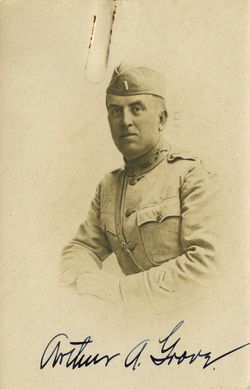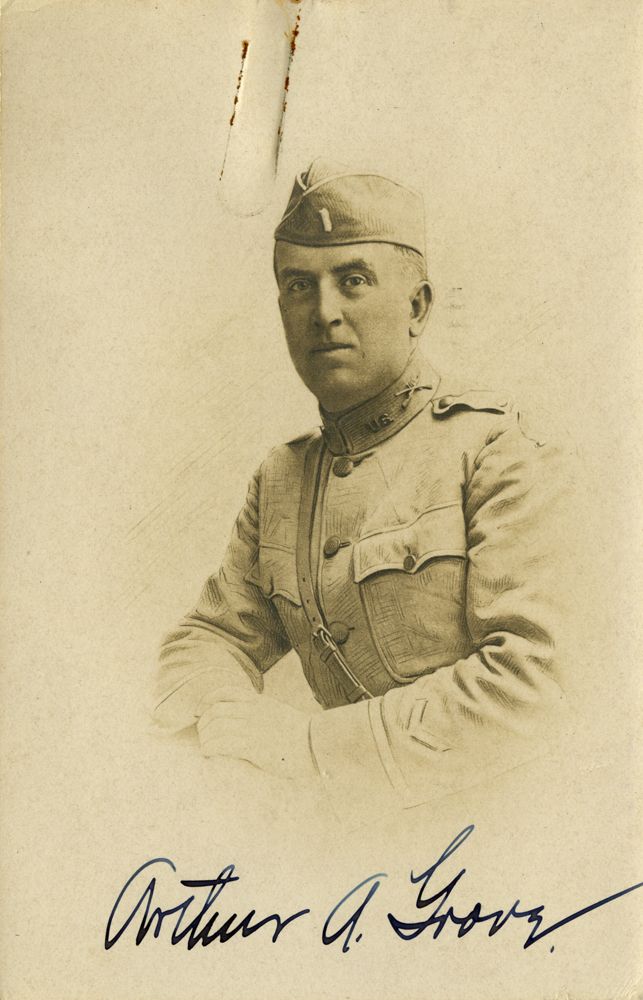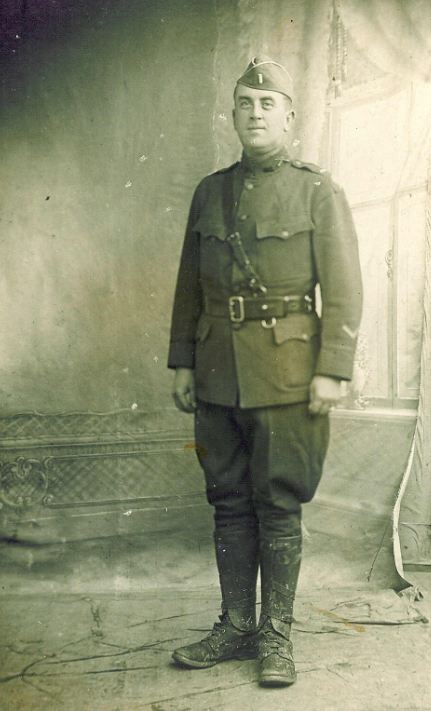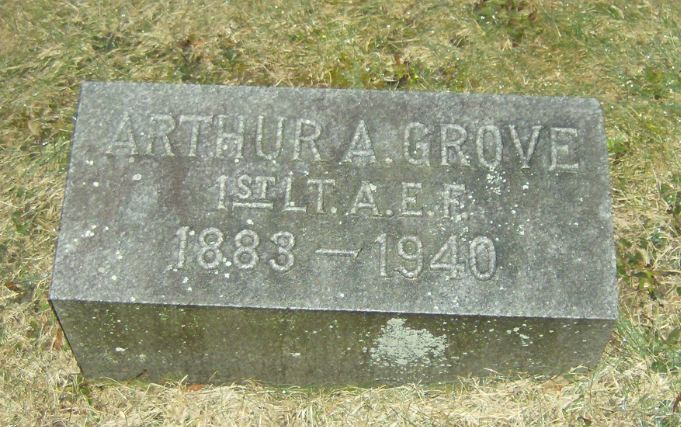The son of a member of Co. E, 35th Battalion Virginia Cavalry, C.S.A., Grove grew up in an era where discussion of the Civil War, by the actual men who served in the ranks, was a very real part of life. Perhaps influenced in part by a sense of duty passed on to him by his father, young Arthur first initiated himself into a military environment by attended Luray Military Academy, under "command" of principal James Horace Morrison, a VMI (1860) graduate and a Confederate veteran. Apparently completing his education at Luray High School, Grove went on to attend Roanoke College by 1900. Two years later, on September 9, 1902, Arthur enlisted with the Page Riflemen, also known as Company C, 72nd Virginia Infantry (National Guard).
In August 1904, Arthur was among those to organize and become the first lieutenant commander of the local Summers-Koontz Camp No. 490, Sons of Confederate Veterans, chartered just a month later in Luray. Additionally, among other things including his responsibilities as a partner in the Grove and Brothers Store, on February 28, 1913, Arthur, along with several other future WW1 veterans including Col. R.F. Leedy and C.G. Mason, met at Luray High School and were among those to form Troop 7 of the Boy Scouts of America. Arthur was the first to be appointed Scoutmaster that same year and was succeeded by Rev. C.J. Gibson in 1914.
By 1916, A.A. Grove's involvement in Luray affairs was winding down for a while. Things were coming to a crucial point in the U.S. involvement in the most recent world affairs. With the Mexican Border Crisis, the Page Rifles were activated, along with the balance of the 2nd Virginia Regiment and many other National Guard units, in 1916. By July, the company was on its way to Brownsville, Texas, where they would remain until February 1917.
Not long after returning to Page, the company was activated again on March 25, 1917 and inducted into regular service in response to the call from President Wilson. Later, as part of the 116th Infantry, 29th Division, Grove commanded a machine gun platoon (in which many other Page County men also served) in France.
Grove's return to civilian life soon resumed with his continued partnership with his brother, Harry E. Grove, in running the Grove and Bro. mercantile store (now the Luray Copy Center) in Luray. However, Grove was not content to rest with his business alone. As with before the war, he continued his participation in the Summers-Koontz Camp No. 490, Sons of Confederate Veterans and participated in many new civic organizations. According to his obituary, "No man in the history of Page County has a broader record of civic interest." Organizations and projects to which Grove had immediate ties included the Shenandoah National Park, the Lee Highway, the Luray Merchants Association, the Luray Rotary Club (of which he was the third president from 1929-30), the Luray Park Board, the past adjutant and commander of the Miller-Campbell Post of the American Legion, the Luray Chamber of Commerce, and the Board of Directors of the Page Valley National Bank of Luray."
On August 14, 1940 Grove fell critically ill and despite all efforts to resuscitate him and despite his being in best of spirits believing he would overcome his illness, Grove died on Wednesday, August 21. His death was a direct result of a heart attack brought on by "physical infirmities resulting from gas received in the World War." In his obituary of August 23, the Page News & Courier noted that his death "filled this community and this section of Virginia with a sorrow and sense of loss seldom experienced." His funeral at Green Hill Cemetery ended with "a regular army firing squad" delivering a 21-gun salute over the grave, followed by the sounding of "Taps." "His service to country and his community identified himself as a true model of Cincinattus . . . the Roman general and citizen-soldier who preferred to return to his farm instead of staying in power."
The son of a member of Co. E, 35th Battalion Virginia Cavalry, C.S.A., Grove grew up in an era where discussion of the Civil War, by the actual men who served in the ranks, was a very real part of life. Perhaps influenced in part by a sense of duty passed on to him by his father, young Arthur first initiated himself into a military environment by attended Luray Military Academy, under "command" of principal James Horace Morrison, a VMI (1860) graduate and a Confederate veteran. Apparently completing his education at Luray High School, Grove went on to attend Roanoke College by 1900. Two years later, on September 9, 1902, Arthur enlisted with the Page Riflemen, also known as Company C, 72nd Virginia Infantry (National Guard).
In August 1904, Arthur was among those to organize and become the first lieutenant commander of the local Summers-Koontz Camp No. 490, Sons of Confederate Veterans, chartered just a month later in Luray. Additionally, among other things including his responsibilities as a partner in the Grove and Brothers Store, on February 28, 1913, Arthur, along with several other future WW1 veterans including Col. R.F. Leedy and C.G. Mason, met at Luray High School and were among those to form Troop 7 of the Boy Scouts of America. Arthur was the first to be appointed Scoutmaster that same year and was succeeded by Rev. C.J. Gibson in 1914.
By 1916, A.A. Grove's involvement in Luray affairs was winding down for a while. Things were coming to a crucial point in the U.S. involvement in the most recent world affairs. With the Mexican Border Crisis, the Page Rifles were activated, along with the balance of the 2nd Virginia Regiment and many other National Guard units, in 1916. By July, the company was on its way to Brownsville, Texas, where they would remain until February 1917.
Not long after returning to Page, the company was activated again on March 25, 1917 and inducted into regular service in response to the call from President Wilson. Later, as part of the 116th Infantry, 29th Division, Grove commanded a machine gun platoon (in which many other Page County men also served) in France.
Grove's return to civilian life soon resumed with his continued partnership with his brother, Harry E. Grove, in running the Grove and Bro. mercantile store (now the Luray Copy Center) in Luray. However, Grove was not content to rest with his business alone. As with before the war, he continued his participation in the Summers-Koontz Camp No. 490, Sons of Confederate Veterans and participated in many new civic organizations. According to his obituary, "No man in the history of Page County has a broader record of civic interest." Organizations and projects to which Grove had immediate ties included the Shenandoah National Park, the Lee Highway, the Luray Merchants Association, the Luray Rotary Club (of which he was the third president from 1929-30), the Luray Park Board, the past adjutant and commander of the Miller-Campbell Post of the American Legion, the Luray Chamber of Commerce, and the Board of Directors of the Page Valley National Bank of Luray."
On August 14, 1940 Grove fell critically ill and despite all efforts to resuscitate him and despite his being in best of spirits believing he would overcome his illness, Grove died on Wednesday, August 21. His death was a direct result of a heart attack brought on by "physical infirmities resulting from gas received in the World War." In his obituary of August 23, the Page News & Courier noted that his death "filled this community and this section of Virginia with a sorrow and sense of loss seldom experienced." His funeral at Green Hill Cemetery ended with "a regular army firing squad" delivering a 21-gun salute over the grave, followed by the sounding of "Taps." "His service to country and his community identified himself as a true model of Cincinattus . . . the Roman general and citizen-soldier who preferred to return to his farm instead of staying in power."
Family Members
Sponsored by Ancestry
Advertisement
Advertisement










